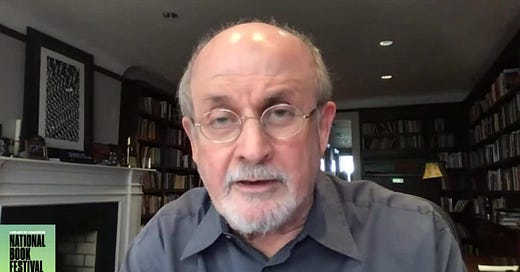The Satanic Verses was neither Satanic, nor written in verse. Discuss.
Salman Rushdie is one of those writers known better as a personality than an author. Folks know what he wrote and the controversies around it, but few have read the book. The Satanic Verses sits untouched on well-curated shelves, alongside, A Brief History of Time by Stephen Hawking, and Infinite Jest by David Foster Wallace. The Satanic Verses, published in 1988 became universally known when Ayatollah Ruhollah Khomeini of Iran put a bounty on the head of its author, forcing Rushdie into years of hiding.
The Middlebrow has never read The Satanic Verses or any Rushdie longer than a short story. The Middlebrow has read a lot more about Rushdie than he has read of Rushdie. The Scholar Wife, who has read Rushdie and who studied with one of his close friends while an undergraduate, is not a fan. Once, The Middlebrow met Padma Lakshmi, one of Rushdie’s exes, at a Crunch gym in New York City. Another time, as a guest of the scholar wife at a book party for Dan Señor and Saul Singer’s book Start-Up Nation, we saw another Rushdie ex, actress Pia Glenn, yell angrily into her phone. That party was thrown by Tina Brown at her Upper East Side Apartment. The Renaissance Son was within the Scholar Wife, who had to default sidestep mogul Mort Zuckerman, who nearly fell on top of her as he tried to navigate the crowd.
Rushdie, now 75-years-old and the fatwah long behind him, was recently stabbed in the neck and thigh by 24-year-old loner Hadi Matar, who has recently pled “not guilty” to charges of attempted murder. Matar is no agent of the Iranian state. He was a New Jersey loner and underemployed loser. He’s likely read no more Rushdie than The Middlebrow, though that will surely out during investigation and potential trial. It’s not immediately clear if Matar was acting on behalf of Khomeini, who died in 1989 when Matar was still a baby.
Khomeini’s call to murder Rushdie was, at the time, considered a stark example of the divide in values between Iran’s religious dictatorship and Western style open society. There was no serious debate about whether Rushdie’s novel had recklessly provoked Khomeini’s followers. Many of the purported insults to Islam in The Satanic Verses are not even accessible to most lay readers (so the Middlebrow has been told) and readers looking for something lurid are typically disappointed.
In 2015, Islamist fascist extremists broke into the offices of French satirical magazine Charlie Hebdo and slaughtered all of the artists they could find. Their offense was to have printed cartoon depictions of Mohammed. According to some interpretations of Islam (The Middlebrow is by now means an authority) this is forbidden. How some Muslims claim to have the authority to enforce Muslim law against nonbelievers has never been adequately explained.
The Charlie Hebdo mass shooting was sadly not universally condemned by Americans or even Europeans, particularly on the left. One issue is that Charlie Hebdo is often right wing and the American left has lost a lot of patience with the right of all stripes since 2016. Similarly, our society now takes the grievances of those who are offended by cultural provocations far more seriously than it ever did. While this does not extend to the outright endorsement of violence there was implication that, by inciting Muslims, the Hebdo team had asked for reprisal. The reaction was so sympathetic to the attackers that Rushdie mused that, had the Fatwah been declared against him in 2015 rather than 1989, that he would not have been supported.
Hopefully, Rushdie will recover, though his injuries seem very serious and he may suffer lifelong disabilities. He deserves better than this and the act of a lonesome Jersey loser, perhaps inspired by the bullying of a long-dead dictator, should not be casually dismissed.



One has to wonder how many of these people
.... or these people for that matter (!) :
"The novel has been accused of blasphemy for its reference to the Quranic Satanic Verses. Pakistan banned the book in November 1988. On 12 February 1989, 10,000 protesters gathered against Rushdie and the book in Islamabad, Pakistan. "
HAVE ACTUALLY READ (and understood/appreciated) THE BOOK !!!??
If so, how could they possibly see it as anything they would want to protest?!